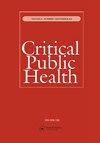论作为种族资本主义(再)殖民化和认识暴力的流行病学
IF 2.3
3区 医学
Q2 PUBLIC, ENVIRONMENTAL & OCCUPATIONAL HEALTH
引用次数: 10
摘要
摘要:这篇评论反映了权力知识的动态以及知识、程序和分配正义的问题,这些问题支撑着与美国种族健康不平等有关的流行病知识生产。基于福柯的权力知识概念——“对象”、“仪式”,和“特权者”——在黑人女权主义哲学家Kristie Dotson对认识暴力的概念化的指导下,它批评了占主导地位的实证主义、还原主义和提取主义流行病学范式,质疑知识生产/策展企业的定居者殖民主义和种族资本主义性质。这篇评论挑战了流行病学对认识论、程序和方法论规范的亲和力,这些规范有效地沉默/抹去了社区知识和细微差别,支持由研究人员产生的简化主义经验表征/重新呈现,而这些研究人员往往从未涉足他们所主张的建模社区。它还明确指出了“色盲”知识生产/管理系统的结构性种族主义现实,该系统由白人学者控制,他们在看不见的白人科学凝视下工作。本着这种精神,这篇评论采用了“学科自我批评”的公共卫生批判种族实践原则,揭示了种族健康公平话语的内在矛盾,该话语未能质疑其知识生产企业背后的种族化权力动态。在这样做的过程中,这篇评论试图(重新)框定并邀请关于认知暴力和(重新)殖民化问题的讨论在流行病学研究中变得明显/清晰,表明必须解决我们集体工作中嵌入并通过集体工作延续的结构性种族主义问题,以推进反种族主义和非殖民化的公共卫生未来。在这方面,我认为诗歌作为实践的价值——作为知识生产/表达的模式,以“中心边缘”,并为流行病学的认识暴力提供反叙事。本文章由计算机程序翻译,如有差异,请以英文原文为准。
On epidemiology as racial-capitalist (re)colonization and epistemic violence
ABSTRACT This commentary reflects upon power-knowledge dynamics and matters of epistemic, procedural, and distributive justice that undergird epidemiological knowledge production related to racial health inequities in the U.S. Grounded in Foucault’s power-knowledge concepts—“objects”, “ritual”, and “the privileged”—and guided by Black feminist philosopher Kristie Dotson’s conceptualization of epistemic violence, it critiques the dominant positivist, reductionist, and extractivist paradigm of epidemiology, interrogating the settler-colonial and racial-capitalist nature of the knowledge production/curation enterprise. The commentary challenges epidemiology’s affinity for epistemological, procedural, and methodological norms that effectively silence/erase community knowledge(s) and nuance in favor of reductionist empirical representations/re-presentations produced by researchers who, often, have never stepped foot inside the communities they aver to model. It also expressly names the structurally racist reality of a “colorblind” knowledge production/curation system controlled by White scholars working from/for an invisibilized White scientific gaze. In this spirit, this commentary engages the public health critical race praxis principle of “disciplinary self-critique”, illuminating the inherent contradictions of a racial health equity discourse that fails to interrogate the racialized power dynamics underlying its knowledge production enterprise. In doing so, this commentary seeks to (re)frame and invite discourse regarding matters of epistemic violence and (re)colonization as manifest/legible within epidemiology research, suggesting that the structural racism embedded within – and perpetuated through – our collective work must be addressed to advance antiracist and decolonial public health futures. In this regard, I suggest the value of engaging poetry as praxis—as mode of knowledge production/expression to “center the margins” and offer counternarratives to epidemiology’s epistemic violence.
求助全文
通过发布文献求助,成功后即可免费获取论文全文。
去求助
来源期刊

Critical Public Health
Multiple-
CiteScore
5.90
自引率
7.10%
发文量
36
期刊介绍:
Critical Public Health (CPH) is a respected peer-review journal for researchers and practitioners working in public health, health promotion and related fields. It brings together international scholarship to provide critical analyses of theory and practice, reviews of literature and explorations of new ways of working. The journal publishes high quality work that is open and critical in perspective and which reports on current research and debates in the field. CPH encourages an interdisciplinary focus and features innovative analyses. It is committed to exploring and debating issues of equity and social justice; in particular, issues of sexism, racism and other forms of oppression.
 求助内容:
求助内容: 应助结果提醒方式:
应助结果提醒方式:


